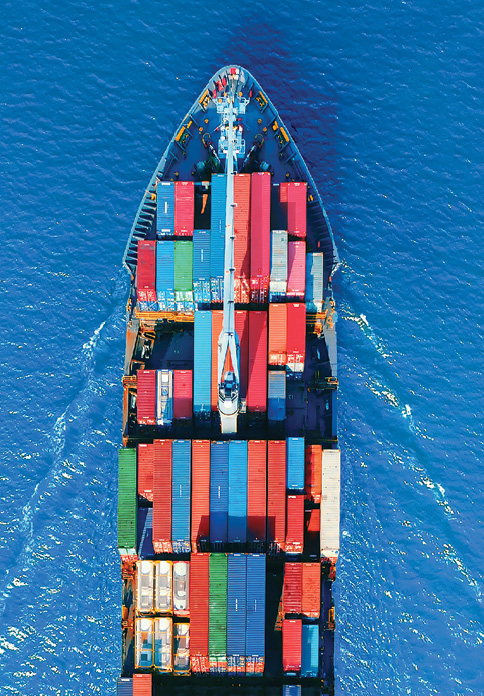Two years of shipping delays and product shortages have led to innovative solutions and a new approach to “business as usual.”
No one is exempt from pandemic-fueled supply chain challenges. From groceries to glass bottles, raw ingredients to packaging materials, it seems every industry has had to manage the absence or reduced availability of at least one element in the links that bind the manufacturing, distribution and promotional chains. For companies who have miraculously avoided this complication on a macro-level, there have been other hurdles, like a complex and sluggish shipping calendar, and the nuisance of everyday outages that impact everything from office supplies to event catering options.

“Everyone is dealing with the choke in the supply chain,” said Gene Tipps, Plexus Worldwide President of Global Operations. “It doesn’t matter if you’re insourcing or outsourcing, coming from China or India, or the other way around. It’s been a pretty big challenge.”
Everyone is dealing with the choke in the supply chain.
—Gene Tipps / Plexus Worldwide President of Global Operations
The direct selling industry has not been immune to these complications, but taking a look at the data, which includes a record-breaking 13.2 percent growth in 2020 and 7.7 million entrepreneurs who participated on a full- or part-time basis, it’s apparent that industry leaders have found industrious and innovative ways to transform what could have been a sales-crushing season into one of the highest growth periods to date.
Communication Is Key
First and foremost, companies who thrived amid supply chain challenges began with one crucial step: Communication. For Plexus Worldwide, each day began with updates for its leaders. There were delays everywhere—in the U.S., Mexico, Australia and Canada—but giving team members an idea of what to expect made the uncertainty more manageable for everyone, from distributors to customers.
“Communication alleviated a lot of their concerns and questions,” said Tipps. “When you don’t communicate, people start conjuring up their own ideas of what’s going on and, in that environment, people tend to swing toward the negative.”
Many companies also deployed website banners, with messages that alerted customers to shipping delays, to manage customer satisfaction levels. These static messages have proven integral to prevent disappointment, but it is the communication between leaders, who then pass it on to their teams, that has made the biggest impact.
“We overcommunicate,” Tipps said. “We are extremely transparent with our leadership base and the relationship we have with them means we keep them in the loop. Then they are able to communicate with their downline so everyone knows what to expect. We know they will be getting hit with all kinds of questions, and we don’t want them to be in a spot where they don’t know the answer.”
Outsmarting the Supply Chain
For those in charge of logistics, the supply chain crisis has presented an enormous puzzle. As facets of the chain became unavailable or impossible to secure, industry executives had to shift each step in the process to accommodate another more readily available solution. Like jigsaw pieces, it took looking at each element from different angles to find just the right fit.
When it seemed like the puzzle couldn’t be solved, many executive leaders simply outsmarted the game.

“It’s all about relationships,” Tipps explained. “You can have all the manufacturing agreements and quality and supply in place, but when something like COVID hits, all that stuff goes out the window.”
Through strong vendor and supplier relationships, built on mutual trust and respect, Tipps said Plexus was able to leverage its connections to stay ahead of the shortages and err on the side of caution. Beyond those, Plexus also went outside of their contract manufacturers to secure packaging components that were notoriously taking longer to arrive. Pre-COVID, the company’s manufacturing partners controlled all of the packaging. With this strategic move, the company was able to dole out critical elements, like induction liners, even when their partners were completely out of stock.
This doubling down on vendor relationships has been the key for many companies, including QuiAri, who increased its supplier roster in preparation for mounting challenges.
“We sought out additional vendors when needed who quickly adapted to the challenges of the pandemic and became more efficient,” said QuiAri Chief Executive Officer Bob Reina. “We’ve learned a lot of valuable lessons from the crisis and will always continue to support the needs of the market as we continue to grow. The crisis only strengthened the relationships between us and our vendors.”
Moving Manufacturing
Having access to products is key, but once those products are in hand, several layers still remain between when a customer’s order is placed, and when it arrives on their doorstep. Even the most minute details can slow a company’s processes. Wooden pallets, for example, were in scarce supply for a period last year. While that might sound insignificant, consider that Australia has strict requirements that stipulate shipments must arrive on wooden pallets with a specific treatment, and that seemingly tiny problem becomes a major roadblock.
Logistical challenges like these have accelerated a decision many companies have considered for a while, which is moving manufacturing closer to North America, if not bringing it home entirely.
We’re looking at bringing some of the manufacturing closer to our shores in North America and are evaluating manufacturers who could help us save on lead times by manufacturing goods here or in Central or South America.
—Matthew Warner / MONAT Global Chief Operating Officer
“We are shifting our supply chain to an Asia Plus One strategy,” said Matthew Warner, MONAT Global Chief Operating Officer. “We’re looking at bringing some of the manufacturing closer to our shores in North America and are evaluating manufacturers who could help us save on lead times by manufacturing goods here or in Central or South America.”
Relocating manufacturing or adding additional manufacturing facilities closer to home would help companies like MONAT avoid the erratic supply chain hiccups that inevitably occur with long distance shipments. The further a shipment has to travel, the more opportunity there is for error or delay—like COVID-impacted worker shortages in factories and deliveries getting bumped off of ships. Regional manufacturing would provide more flexibility to respond to individual markets. It would also shorten the lead time necessary for companies to accurately forecast their supply needs.
“If I’m looking at forecasting a bottle I need to source, normal lead time from China is six months right now,” Warner said. “If I can do that in America, my forecast accuracy is far better and more precise. Our forecast accuracy has improved as we bring manufacturing closer to home.”
The Brand Takes Precedence
At the end of last year, the backlog of container ships waiting to be unloaded was mind boggling. In Los Angeles alone, almost half a million containers were waiting in drift areas—a holding location where containers often waited up to a month before a space on the port became available.
Securing shipping containers became impossible at times, and when they were available, the delivery delays were extensive. To circumvent these challenges, many companies turned to air freight, which had the disadvantage of costing up to ten times more than traditional shipping. It was a decision that cut deeply into profits, but protected brands from breaking promises to customers and distributors they had spent years building relationships with.

“We felt like we had an obligation to people, even though it was a financial burden for the company,” Tipps said. “Everything is about our brand and relationships with leaders and customers. It was short-term pain for long-term gain.”
There have been other creative delivery channels during this season, like MONAT’s contract with a “fast boat” service that allowed shipments to be loaded and unloaded more quickly than traditional shipping containers without jumping the line, and QuiAri’s method of shipping from different distribution locations to speed delivery. It’s an approach that is in keeping with the small business mentality of the direct selling industry, which requires innovative problem solving, heart and grit.
“During the pandemic, there were some lessons learned about importing and exporting supplements, getting product approvals and finding alternative shipping carriers when the ports and governments were all closed,” Reina said. “But we have a ‘whatever it takes’ philosophy. Even though it was more expensive, we sent product via air freight, and we constantly stayed in contact with local government officials to be sure all approvals that were pending were in the pipeline.”
New Strategies for a New Normal
No business could have predicted a global pandemic or the challenges it would bring with it, but hindsight is teaching many executives a new way to approach the logistics involved in delivering high-quality products across a challenging and rapidly evolving supply chain system.
Leaders who have endured these challenges are now equipped with new strategies, like keeping a larger quantity of safety stock on hand and owning the hard-to-source packaging elements on their own, rather than depend on a second- or third-party manufacturer to keep them in stock. Decentralized manufacturing that allows for a flexible response to international markets is also becoming more attractive.
“Companies like Amazon, Wal-Mart and Tesla didn’t suffer,” Reina said. “They found creative ways to adapt their business strategy to overcome the disruptions. We might not be as big as Amazon or Wal-Mart, but we have the same mindset and operate like a multibillion-dollar company.”
From the April 2022 issue of Direct Selling News magazine.


